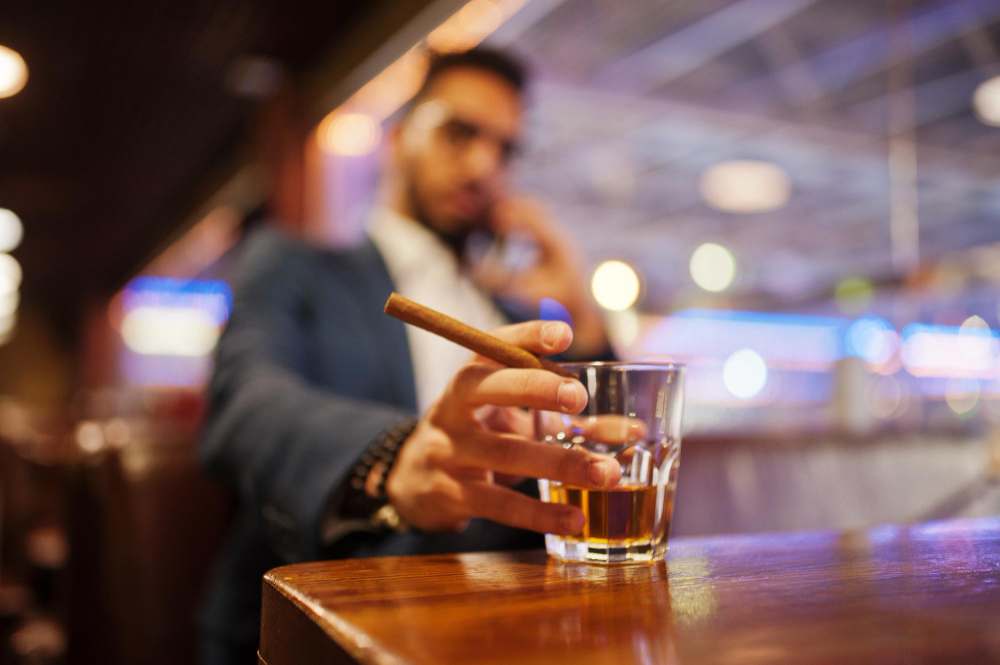They say ignorance is bliss, but not in the UAE! If you’ve ever wondered about the legalities of alcohol & drug consumption in the UAE, our blog is your gateway to understanding the laws.

1. License to Drink in UAE
According to Article 313 Bis (1), “There shall be no punishment for consuming, possession or trading in alcohol drinks in the situations and at places allowed as per applicable legislation.” This clause highlights that certain situations and places are legally designated for consuming, possessing, and trading alcohol, provided they adhere to UAE law.
Additionally, non-expats were required to carry this license when drinking in establishments outside their homes. However, recent reforms have eliminated the need for a license to drink alcohol in hotels and restaurants, streamlining the process for expats and tourists.
2. Variations Across Emirates
As stated in Article 313 Bis (2), “Subject to (1) of this Article, each Emirate shall regulate consuming, possession, dealing with and trading in alcoholic drinks.” For instance, Sharjah remains a “dry” emirate, where alcohol is not served even in international hotels. However, in Ajman, expatriates have never needed permits to purchase alcohol. It’s essential to acquaint yourself with the specific rules of the emirate you plan to visit.
3. What is Illegal in the UAE?
Public Consumption Restrictions:
While drinking alcohol is legal within licensed bars and restaurants, it is prohibited in public places or unlicensed areas. It’s crucial to refrain from drinking on non-hotel beaches or in parks, even if you have legally purchased alcohol. Meanwhile, law consultation in Dubai can provide legal services & representation to ensure your rights are protected.
Underage Drinking:
Article 313 Bis (3) strictly enforces a legal drinking age of 21 and punishes those providing or selling alcohol to individuals under this age.
Zero-Tolerance for Drink and Drug Driving:
The UAE enforces a zero-tolerance policy for drunk and drug driving. Even consuming a single liqueur of chocolate can result in severe penalties, including a minimum fine of Dhs20,000 (approximately US$5,500/ AU$7,800) and imprisonment.
Understanding and navigating the legal landscape in the UAE is crucial to avoid severe consequences. Consult the best Dubai legal consultant or law consultants in Dubai for personalized legal advice.
Drug Laws in the UAE:
4. Strict Drug Laws: Zero Tolerance
The UAE maintains an uncompromising stance against the recreational use of drugs. Under Federal Law No. 14 of 1995, engaging in the production, import, export, transportation, purchase, sale, possession, or storage of narcotic and psychotropic substances for non-medical or non-scientific purposes is a criminal offense. This holds unless these activities are conducted as part of regulated medical or scientific endeavors, in compliance with applicable laws. The UAE law enforcement, equipped with specialized drug enforcement units, actively combats drug-related issues.
5. Relaxed THC Laws
Recent legal changes have relaxed laws surrounding THC, the psychoactive component of cannabis, for personal use. Carrying items containing THC will no longer lead to prison sentences, but the substance will be confiscated, and fines may apply. However, cannabis oil in vapes or e-cigarettes remains strictly prohibited.
6. Prescription of Controlled Medicines: Regulatory Details
In Abu Dhabi, the prescription of narcotics can only be authorized by a physician licensed by the Health Authority of Abu Dhabi (HAAD) for in-patients, utilizing approved narcotic prescription forms. Generally, private sector prescriptions for outpatient narcotic supplies are not permitted, but exceptions may be considered upon request from a medical director.
For psychotropics, particularly Class A (CDa) drugs, specialized requirements apply. These must be prescribed on official psychotropic prescription forms by HAAD-licensed physicians. UAE federal law sets restrictions on the duration of prescription supply for CDa and CDb drugs, contingent upon the prescriber’s qualifications. There are no extraordinary prescription requirements for ordering psychotropic CDb drugs for either in-patients or out-patients, allowing normal medical prescriptions.
7. Blood and Urine Tests
The presence of illegal drugs in blood or urine tests is considered possession, leading to prosecution, fines, and imprisonment. Some employment contracts in the UAE require mandatory drug tests, emphasizing the seriousness of drug-related issues.
8. Penalties for Drug Use:
For first-time drug offenders, penalties have been reduced from two years to three months, with rehabilitation offered. However, the penalties for harder drugs and drug trafficking remain severe, including substantial fines and lengthy prison sentences.
9. Drug Rehabilitation
The National Rehabilitation Center (NRC) in Abu Dhabi plays a pivotal role in researching and addressing drug abuse issues. It provides rehabilitation and treatment programs for individuals struggling with drug abuse.
In conclusion, while the UAE welcomes visitors from around the world, it’s essential to respect and adhere to its laws regarding alcohol and drug use. Stay informed, exercise caution, and seek legal advice when needed to ensure a safe and enjoyable experience in this beautiful country. Remember, “Ignorantia Juris non-excusat” – ignorance of the law excuses no one.
